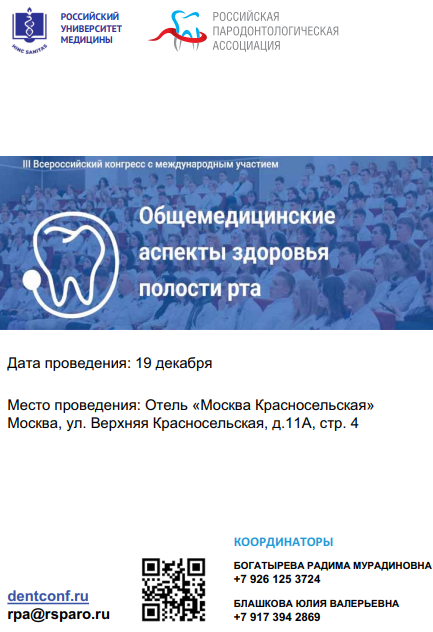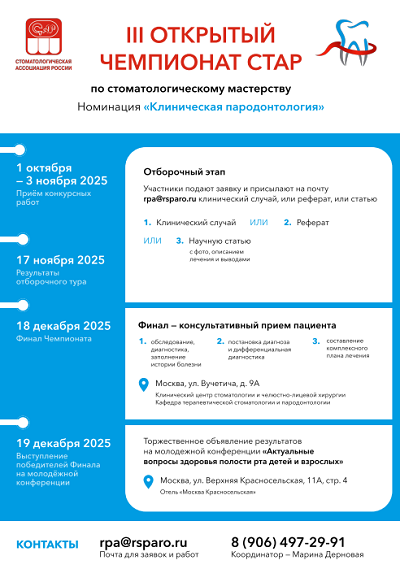Assessment and correction of the daily diet in the treatment of severe early childhood caries
https://doi.org/10.33925/1683-3031-2021-21-1-42-46
Abstract
Relevance. The high prevalence and intensity of early childhood caries (ECC) require a detailed analysis of the influence of the nutritional status on the course of the carious process and possible ways to treat severe caries and control certain markers of calcium and phosphorus metabolism. Purpose – to identify correlation between the nutrient composition of the diet, calcium and phosphorus metabolism markers and severe childhood caries.
Materials and methods. The study involved 46 children aged 12-36 months with severe ECC which had been treated under the general anesthesia. In all patients, the nutrient composition of the diet was studied and certain markers of calcium and phosphorus metabolism were determined. ECC comprehensive treatment plan with further evaluation of the effectiveness of the treatment was developed accordingly, based on the patients’ allocation to the main and comparison groups.
Results. The dynamics of the content of excreted calcium in the main group of study participants indicates an increase in the consumed calcium entering the child's body with food. 24 months after the implementation of pathogenetic therapy, the increase in the intensity of caries in the main group was significantly reduced.
Conclusions. The correlation analysis revealed a strong correlation between the frequency of consumption of the basic food products and caries intensity in the primary teeth. Patient-based ECC treatment protocols can reduce caries progression in primary dentition by 42.8 % in the long run.
About the Authors
M. A. DanilovaRussian Federation
Danilova Marina A., PhD, MD, DSc, Professor, Head of the Department of pediatric dentistry and orthodontics
Perm
D. V. Kamenckikh
Russian Federation
Kamenckikh Daria V., PhD, Associate Professor of the Department of pediatric dentistry and orthodontics
Perm
References
1. Branger, B., Camelot, F., Droz, D., Houbiers, B., Marchalot, A., Bruel, H., Laczny E., Clement, C. Breastfeeding and early childhood caries. Review of the literature, recommendations, and prevention. Archives of Pediatrie. 2019;26(8):497-503. https://doi.org/10.1016/j.arcped.2019.10.004.
2. Evans, R.W., Feldens, C.A., Phantunvanit, P. A protocol for early childhood caries diagnosis and risk assessment. Community Dentistry and Oral Epidemiology. 2018;46(5):518-525. https://doi.org/10.1111/cdoe.12405.
3. Folayan, M., Olatubosun ,S. Early Childhood Caries. A diagnostic enigma. European Journal of Paediatric Dentistry. 2018;19(2):88. https://doi.org/10.23804/ejpd.2018.19.02.00.
4. Javed, F., Feng, C., Kopycka-Kedzierawski, D.T. Incidence of early childhood caries: A systematic review and meta-analysis. Journal of Investigative Clinical Dentistry. 2017;Nov:8(4). https://doi.org/10.1111/jicd.12238.
5. Skripkina, G. I. Clinical-laboratory parameters of subclinical curing of the caries in the childhood age. Pediatric dentistry and dental profilaxis. 2017;16(4):24-27. (In Russ.). https://elibrary.ru/item.asp?id=32389346.
6. Carkova, O. A., Machulina, N. A., Kamenskih, D. V. Features of carrying out prevention of caries of teeth at children with violation of nasal breath. Pediatric dentistry and dental profilaxis. 2018;17(1):34-36. (In Russ.). https://doi.org/10.25636/PMP.3.2018.1.8.
7. Danilova, M. A., Machulina, N. A., Shevcova, Yu. V., Kamenskih, D. V. Clinical and experimental justification of the application of various sealing materials in children of preschool age. Pediatric dentistry and dental profilaxis. 2019;19(2):31-36. (In Russ.). https://doi.org/10.33925/1683-3031-2019-19-2-31-36.
Review
For citations:
Danilova M.A., Kamenckikh D.V. Assessment and correction of the daily diet in the treatment of severe early childhood caries. Pediatric dentistry and dental prophylaxis. 2021;21(1):42-46. (In Russ.) https://doi.org/10.33925/1683-3031-2021-21-1-42-46





































